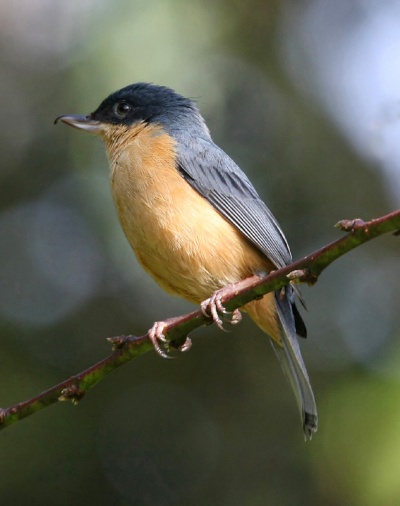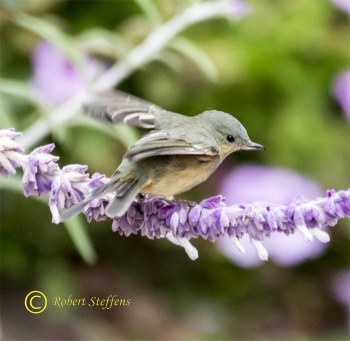(picture of female) |
|||
| Line 6: | Line 6: | ||
'''Male''': Bluish above and Cinnamon below. Face somewhat darker.<br /> | '''Male''': Bluish above and Cinnamon below. Face somewhat darker.<br /> | ||
'''Female'' is brownish green above and a dingy yellow below with streaks on throat and chest. | '''Female'' is brownish green above and a dingy yellow below with streaks on throat and chest. | ||
| + | |||
| + | ===Similar species=== | ||
| + | Female [[White-sided Flowerpiercer]] is often darker brown with a (usually concealed) whitish flank stripe. Female Rusty may show yellowish wing bars and (especially) pale fringes to the tertials. It may also be paler | ||
==Distribution== | ==Distribution== | ||
Revision as of 13:39, 24 April 2023
- Diglossa sittoides
Identification
11 cm (4¼ in); Bicolored
Male: Bluish above and Cinnamon below. Face somewhat darker.
'Female is brownish green above and a dingy yellow below with streaks on throat and chest.
Similar species
Female White-sided Flowerpiercer is often darker brown with a (usually concealed) whitish flank stripe. Female Rusty may show yellowish wing bars and (especially) pale fringes to the tertials. It may also be paler
Distribution
South America: found in Colombia, Venezuela, Ecuador, Peru, Bolivia and Argentina
Taxonomy
Subspecies
There are 5 subspecies[1]:
- D. s. hyperythra:
- D. s. dorbignyi:
- D. s. coelestis:
- Sierra de Perijá (Colombia/Venezuela border)
- D. s. mandeli:
- Subtropical mountains of north-eastern Venezuela (Mount Turumiquire in Sucre)
- D. s. decorata:
- D. s. sittoides:
Habitat
Mountainous areas, particularly shrubby areas, pastures, open woodland scrub and forest edges.
Behaviour
Diet
Their diet consists of nectar and a variety of small insects.
References
- Clements, J. F., T. S. Schulenberg, M. J. Iliff, D. Roberson, T. A. Fredericks, B. L. Sullivan, and C. L. Wood. 2015. The eBird/Clements checklist of birds of the world: v2015, with updates to August 2015. Downloaded from http://www.birds.cornell.edu/clementschecklist/download/
- Avibase
- Handbook of the Birds of the World Alive (retrieved November 2015)
Recommended Citation
- BirdForum Opus contributors. (2024) Rusty Flowerpiercer. In: BirdForum, the forum for wild birds and birding. Retrieved 7 June 2024 from https://www.birdforum.net/opus/Rusty_Flowerpiercer






